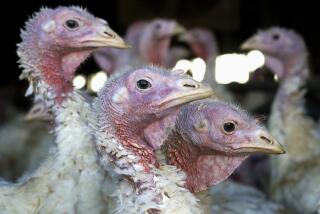Baby Affected by Bacteria Released by UCI Hospital
- Share via
Francisco Javier Rojas, who was born with a disease-producing bacteria one day after his mother said she ate a “whole” package of Jalisco-brand Mexican cheese, was released Tuesday from UCI Medical Center in Orange.
The 17-day-old infant’s chances for a full recovery and normal life are “excellent,” said UCI neonatologist Jack Sills.
“Although I’m not going to say we’re going to have a 100% chance of having normal neurologic development,” Sills said, “I feel the prognosis is excellent.”
The baby’s mother, Adrianna Rojas-Rodriguez, 19, radiant amid a wash of bright television lights, and her husband, Francisco Javier Martinez, 22, told reporters they felt “confident and happy.”
“We intend to take care of our baby,” the young mother said.
The mother said she did not have any unusual symptoms that she knew of during her pregnancy to indicate there was a problem.
She said she has “always” eaten Jalisco-brand cheese, a flaky, white cheese popular in Latino kitchens. “We love it,” she said.
“We’ve always eaten that cheese. We didn’t know it was bad,” her husband said. “We knew something was wrong when things went bad (for the baby). But we still didn’t know from what.”
Oliver F. Moench, an attorney representing the Garden Grove family, said he intends to file a lawsuit on their behalf this week in Superior Court against Stater Brothers Market, where the mother bought the cheese, the manufacturer and the milk supplier.
“There is a possibility of mental retardation and ill effects on the baby’s physical development,” Moench said.
Stater Brothers’ officials could not be reached for comment late Tuesday.
The Rojas baby was the second infant affected by the bacteria, Listeria monocytogenes, to go home this week from the medical center. On Monday, 7-week-old Erika Mendoza also was discharged from the hospital, said hospital spokeswoman Barbara Firgir.
A third infant, 2-week-old Sergio Flores, remains in the hospital and was listed Tuesday in good condition.
Chances that a fourth baby, born Monday night at the hospital, has the disease lessened Tuesday, said another UCI neonatologist, Feizal Waffarn. He said the baby, at first suspected of having symptoms similar to those of listeriosis, is being watched carefully.
In recent months, the listeriosis bacteria has stricken 17 people and caused the deaths of seven babies in Orange County, health officials said.
The bacteria brings on flu-like symptoms in otherwise healthy adults but can cause death in babies, the elderly and people with weak immune systems. It has been linked to consumption of cheese manufactured by Jalisco Mexican Products of Artesia, according to health officials.
Two Babies Died
Three babies at the medical center were delivered stillborn because of listeriosis. Four more were born with the infection, and two of those babies died--one minutes after birth, the other just 10 hours after the infection was diagnosed.
Sills, however, was hesitant to give the Rojas baby a clean bill of health. “There’s always risk for an abnormal neurologic outcome,” he said.
The infant boy had pneumonia, liver disease, and kidney and blood-clotting problems, Sills said. For two days, when the baby had trouble absorbing oxygen, he breathed with the help of a ventilator. Doctors then used an oxygen hood for seven more days until they said the infant was ready to breathe room air.
“The pneumonia is gone. There is no permanent lung damage,” Sills said.
The baby’s EEG tests (for brain waves) and neurologic exam were “normal,” he said, adding that the baby will be treated as an “at risk” case on an outpatient basis with monthly checkups.
Sills also was careful to avoid giving the impression that the child’s development was free of risk or that the bacteria was totally gone.
“I have to reserve that until the baby is walking and talking and reading in school. I would wait at least three or four years before saying the baby is 100% normal.”
As for the bacteria, Sills said he believed it was totally treated. “We don’t have any evidence that it is still there. But for the next few weeks, if there’s any fever or any signs of something being amiss, we’ll have them come back immediately.”






